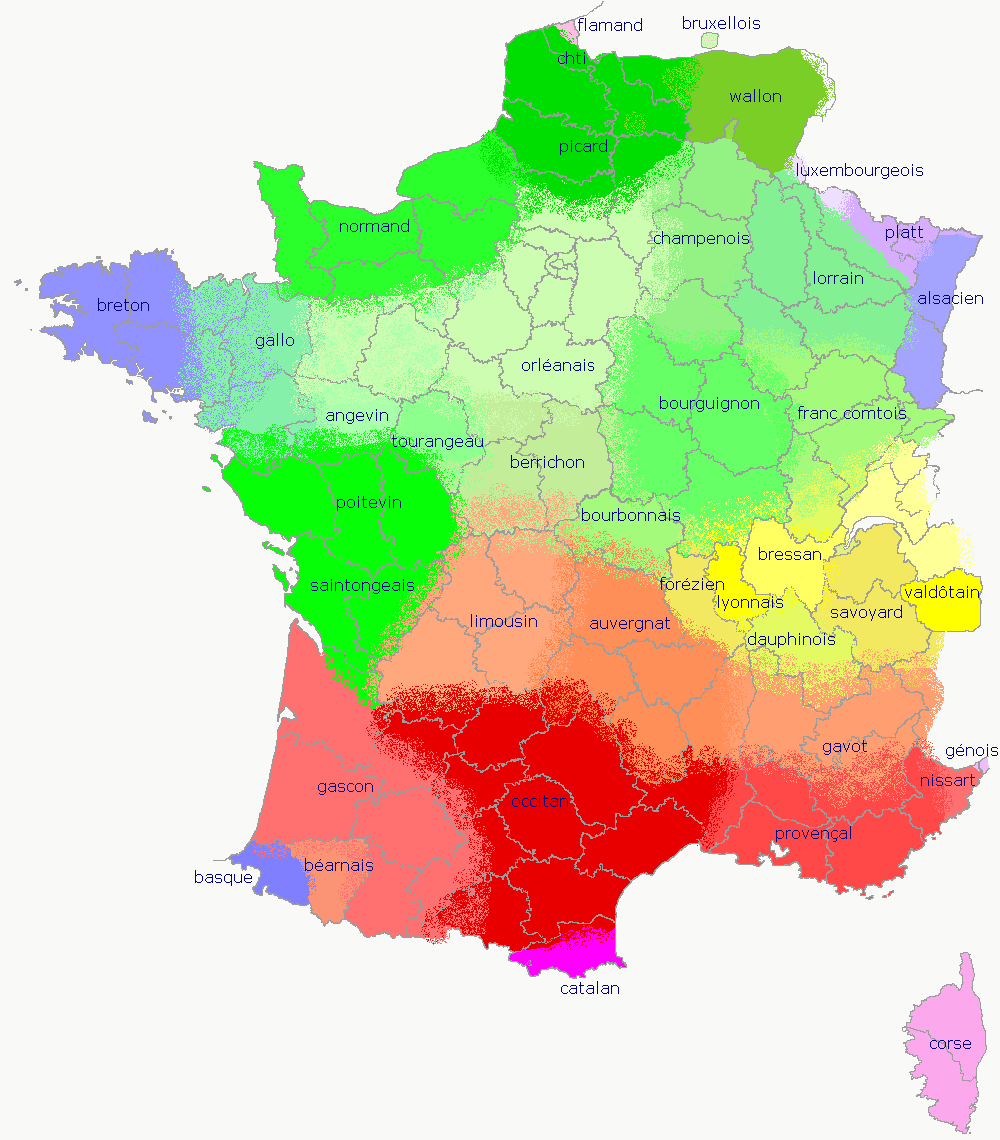I have been looking at some linguistic maps of France, like this one:
It seems there are local non-French languages everywhere, but I wanted to test that with a local person. Today I got my opportunity. I went for a haircut, armed with some basic haircut-related vocabulary: plus cour (shorter), derriere (back), avant (front), a cote (side). I managed to communicate what I wanted: number four back and sides, and shorter all over. Like every other hairdresser I have met, my hairdresser today was up for some conversation.
I found out that he was born in Quillan and lived nearly all his life here. He was aged about mid-30s. I asked him what the local language is. In Quillan? He looked at me like it was a very stupid question. French. So you grew up speaking French? Yes. Any other language? Now I think he saw what I was asking about. Patois. I had learned that term recently; it means a local dialect. You speak patois? Yes. What language is it? Occitan. I knew there were multiple occ or occitan languages. Languedocian? He corrected my pronunciation, but then said C’est ca. (That’s it.) Languedocien. He said his grandparents in a nearby village Mijanes have a different patois. He said it (not sure whether he meant the Quillan patois or the Mijanes patois) is not like French, but not like Spanish or Catalan either. I asked if it is a written language. Yes, it’s a proper language. Most of that he said in English because my French was so obviously poor. I do envy and admire people who have multiple languages.



In managing to converse with a hairdresser, I think you’ve faced up to the most difficult thing to do in a foreign language – courageously and with your usual sense of enquiry. Félicitations! I’ve consulted some of those linguistic maps of France too, notably in respect to Brittany and the fascinating local variations between where it may be appropriate to use tu or vous when speaking to people. Be thankful you’re in the south where it’s simpler!
It’s always very heartwarming to see new people getting interested in the intricacies of the French linguistic diversity, which too often is being unknown, ignored or plainly negated. If you feel like learning more about the occitan language, you’re very welcome in the CIRDOC, located in Beziers (not that far from Quillian) or to send us an enquiry through or Q/A box:
http://occitanica.eu/index.php/fr/2014-06-06-09-38-27/2014-06-06-09-38-45
Your headresser is absolutely welcome with us too if he wants to know how, though there might be lexical and grammatical discrepancies, his and his grandparents’ “patois” – the term is actually derogatory, but for a long time had been the only one available to occitan speakers to define their language – indeed belong to the very same language!
Fun fact: the map you’re using is not exactly accurate. Occitan actually covers all that’s red or pink over there. There’s a bit of a mix-up there: the area labelled “occitan” actually corresponds to the “lengadocian” variety of the occitan language. The actual subdivisions of the occitan language (AKA Langue d’oc) are Gascon (which include béarnais), Limousin, Auvergnat, Languedocien, Provençal (which includes Nissart) and Vivaro-Alpin. Occitan is also spoken in Spain (Val d’Aran in Catalunya, where it’s a co-official language) and Piemont in Italy.
(See for exemple this map http://estivada-rodez.eu/carte-de-loccitanie/ or this one http://www.ieo-oc.org/Carte-de-l-Occitanie for a better grasp on occitan diversity – and unicity)
Again, thanks a lot for contributing to making the French minoritarian languages better known all over the world.
Thank you for your comments and your invitation to CIRDOC. If I get a chance, I will pass the invitation on to the hairdresser. I didn’t realise ‘patois’ was a derogatory term – I will be careful how I use the term from now on. Thank you also for the link to the linguistic maps, which I do plan to study. The link for the second map http://www.ieo-oc.org/Carte-de-l-Occitanie does not work for me. Perhaps you could check it?
The link works for me, could it be that the site was down for a little while? Also, the use of the term “patois” is indeed derogatory (“pidgin” might be an acceptable translation) but for a lot of people,(including many older, native Occitan speakers) patois is what they’ve always called their language, and “occitan” might be seen by them as an alien, “sophisticated” word. So that although not politically correct, asking about patois can be a good call to get people to talk about the language. It all depends on the setting. (Also, some people are reclaiming the term, though in this instance it can still be seen as derogatory for a non-speaker to use it.)
I just felt like adding that one of the most successfull Occitan poets from the XIXth century was a hairdresser! Jasmin, a poet hairdresser from Agen, was a sensation in Parisian literary salons and was celebrated by one of the top French critics of its time, Sainte-Beuve.
http://occitanica.eu/omeka/items/show/306